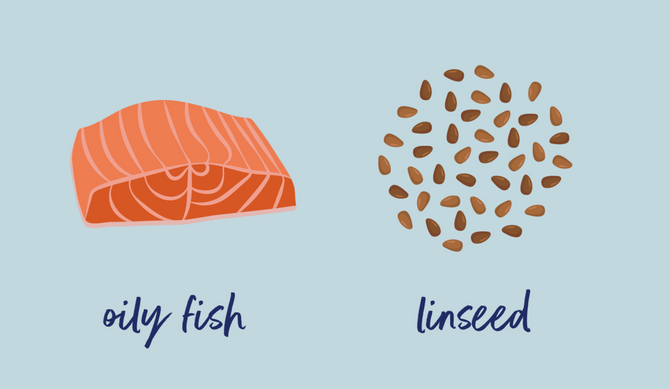We hear a lot about omega-3 in our diets. But how important are omega-3 fatty acids for our dogs? Our vet and nutritionist team is here to explain why omega oils should be a staple of every dog’s diet.
What is omega-3?
Omega-3 belongs to a group of special fats known as essential fatty acids. They’re ‘essential’ because they can’t be made in the body – they need to come from food. There are three main types of omega-3:
- Eicosapentaenoic acid (EPA) – from oily fish
- Docosahexaenoic acid (DHA) – from oily fish
- Alpha-linolenic acid (ALA) – from nuts and seeds, like linseed and walnuts
At tails.com we use a range of high-quality ingredients that are rich in omega-3 – like fish oil and plant sources such as linseed.

What are the benefits of omega-3?
Omega-3 is good for your dog’s all-round health. Its benefits include:
1) Cell maintenance
Essential fatty acids provide the building blocks for cell maintenance.
2) Organ health
Omega-3 supports kidney, eye and liver health. Omega-3 from fish oils is also good for the heart; it’s been shown to reduce arrhythmia and has an anti-inflammatory effect.
3) Glossy coat
Foods that are rich in omega-3 – or more specifically, ALA – help keep your dog’s coat shiny and oh-so-cuddly.
3) Healthy skin
The immune-boosting properties of ALA support your dog’s natural skin defences, to improve dry skin, dandruff and many other skin problems. It also helps your dog fight off skin infections and parasites.
4) Immune system
Immune support is another big benefit of omega-3. If your dog’s a puppy, a senior, or recovering from illness, they’re more vulnerable to infection and inflammation – making omega-3 even more important.
5) Joint support
Studies show omega-3 oils can improve activity and performance in dogs with osteoarthritis. How? By reducing early signs of the condition. For example, omega-3 keeps collagen and cartilage healthier for longer, and helps give your dog’s joints the shock absorbing properties they need.
6) Reducing allergic reactions
Essential fatty acids can help ease the skin irritation and itchiness caused by allergies.
Is omega-3 important for puppies?
It’s hard to overstate the benefits of DHA omega-3 for puppies. This super-fat has been shown to make them smarter, happier and healthier. The specific benefits of DHA for puppies include:
1) Immune system
DHA helps to boost your puppy’s immune system and improves their response to vaccinations. This is crucial at a time when their immune system is immature, but they’re ready to explore the world – and all its germs.
Before they’re weaned, puppies get DHA from their mother’s milk. Once they move on to puppy food, it’s important to make sure they get enough DHA from their diet.
2) Mental development
Studies show dogs who get the right level of omega-3 as puppies grow up to be more sociable and better at learning. The results make compelling reading: puppies who are given DHA omega-3 are happier, more confident, and better adjusted.
We make sure tails.com puppies get the full benefits of DHA by always including high-quality sources, like salmon oil, in their feeding plan until they’re 14 weeks old – often older.
Related blog: 5 of the best superfoods to enhance your dog’s intelligence
3) Eye health
A diet that’s rich in omega-3 supports your puppy’s rapidly developing vision. This helps them explore their world, and discover new and exciting ways to get into mischief.
How much omega-3 does my dog need?
Factors that affect how much omega-3 your dog needs include:
- Age
- Weight
- Activity level
- Joint health
- Allergies
If your dog’s on prescription anti-inflammatory medication, check with a vet before you up the amount of omega-3 in their diet – high levels can stop these treatments working effectively.
There’s lots to consider, but for tails.com customers, working out how much omega-3 your dog needs is easy – we do it for you. This isn’t a best guess or a ballpark figure; we create an individual recommendation based on what you tell us about your dog. If they’re high-energy, have skin or coat issues, or need extra joint support, we can add kibbles with higher levels of omega oils to their blend.
Can dogs get too much omega-3?
The benefits of omega-3 are hard to beat. But more omega-3 doesn’t necessarily mean more reward – in fact, too much can be as bad as too little. That’s partly down to how omega-3 interacts with another essential fatty acid: omega-6.
Omega-3 has an anti-inflammatory effect. Omega-6 has inflammatory properties. Both are beneficial to your dog’s health, but they can stop each other working efficiently, so balance is key. If you add more omega-3 to your dog’s diet, you may need to add more omega-6 too.
With a tailored feeding plan from tails.com, you can be sure you’re giving your dog the right ratio – somewhere between 10:1 and 3:1, depending on your dog’s needs.
Got questions about omega-3 for dogs? Get in touch at hello@tails.com – our veterinary and nutritionist team is here to help.


greatly elaborated. excellent work.